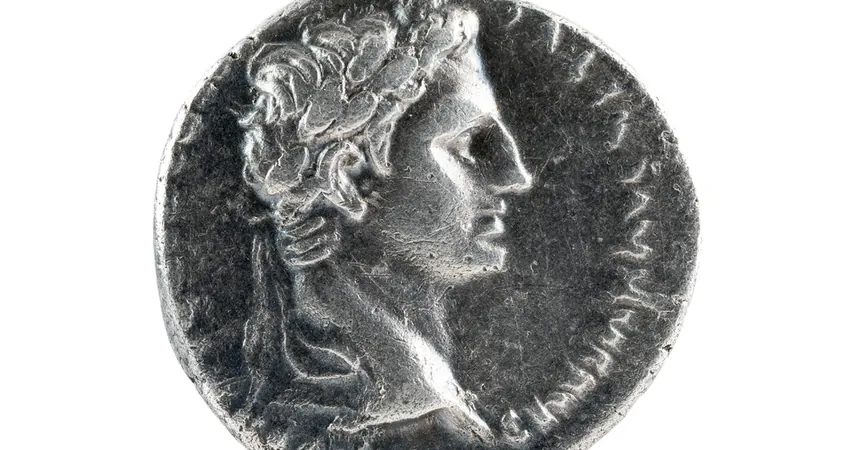
Did Lead Poisoning Contribute to the Decline of Roman Intelligence? Shocking New Research Unveils the Dark Side of the Empire!
2025-01-06
Author: Chun
Lead Pollution in Ancient Rome
Around 2,000 years ago, while the Roman Empire reached unprecedented heights of power and influence, a hidden menace lurked beneath its majestic veneer: lead pollution.
A recent study published in the Proceedings of the National Academy of Sciences has unveiled alarming evidence that widespread airborne lead from extensive mining operations may have significantly impaired the health and intelligence of the Roman populace. This revelation casts a new light on the capabilities of a civilization that advanced mathematics, architecture, and governance.
Mining Operations and Lead Production
During the Pax Romana, a period that spanned nearly two centuries starting in 27 B.C., the Roman Empire flourished across Europe, the Middle East, and North Africa. Silver coinage was essential to this thriving economy, which necessitated vast mining operations. However, experts such as Joseph McConnell, an environmental scientist from the Desert Research Institute, clarified that the extraction of silver also resulted in a staggering byproduct: lead. "For every ounce of silver mined, approximately 10,000 ounces of lead were produced," McConnell noted.
Health Implications of Lead Exposure
The implications of lead exposure are dire. Deborah Cory-Slechta, a neurotoxicologist, emphatically stated, "There is no safe level of lead exposure." Recent research methods have enabled scientists to detect lead captured in ancient ice cores from Greenland and Russia, tracing its presence back to Roman mining activities. Lead particles migrated into the atmosphere through industrial processes, drifting long distances and eventually falling as snow in the Arctic regions.
Despite the minute concentration detected—roughly one lead molecule per trillion molecules of water—the researchers established that this lead originated from Roman operations and could have polluted vast areas.
Quantifying Lead Emissions
Using advanced atmospheric models, McConnell's team calculated that Roman silver mines emitted between 3,300 and 4,600 tons of lead annually. They assessed how this lead spread throughout the empire and ultimately estimated the exposure levels for ancient Roman children. Since children are particularly vulnerable to lead absorption, the findings indicate that young Romans could have accumulated an additional 2 to 5 micrograms of lead per deciliter of blood, potentially resulting in an average IQ decrease of 2 to 3 points.
For perspective, children in the U.S. during the 1970s had average blood lead levels about 15 micrograms higher due to leaded fuel and paints, correlating to an approximately 9-point IQ decrease. The repercussions of lead exposure are unrelenting; higher blood lead levels are also linked to increased incidences of preterm births and cognitive decline in later life stages.
Revisiting Theories on the Empire's Fall
While previous theories have suggested that lead poisoning could have contributed to the Empire's fall, the debate is complex. A study in 2014 argued that though lead pipes did increase water contamination, it likely wasn't harmful enough to deplete the Empire’s vitality. However, the recent findings surrounding mining pollution may significantly reshape our understanding of the health-related challenges faced by Romans.
Conclusion
Hugo Delile of the French National Centre for Scientific Research weighed in, stating, “This research highlights the extensive lead pollution from Roman mining activities.” Truly, this investigation reveals a grim side to the glorious Roman Empire, underscoring the devastating health impacts that precipitated the decline in cognitive abilities within a society famed for its brilliance.
Dr. McConnell provocatively concluded that Roman lead mining may represent "the earliest example of widespread industrial pollution," forcing us to reconsider what we think we know about this remarkable civilization.
The once-glorious Empire, revered for its achievements, now stands shadowed by a hidden toxin—one that might just have dulled the brilliance of an entire generation. How many of Rome's secrets and mysteries remain locked away in the layers of history and pollution?
 Brasil (PT)
Brasil (PT)
 Canada (EN)
Canada (EN)
 Chile (ES)
Chile (ES)
 Česko (CS)
Česko (CS)
 대한민국 (KO)
대한민국 (KO)
 España (ES)
España (ES)
 France (FR)
France (FR)
 Hong Kong (EN)
Hong Kong (EN)
 Italia (IT)
Italia (IT)
 日本 (JA)
日本 (JA)
 Magyarország (HU)
Magyarország (HU)
 Norge (NO)
Norge (NO)
 Polska (PL)
Polska (PL)
 Schweiz (DE)
Schweiz (DE)
 Singapore (EN)
Singapore (EN)
 Sverige (SV)
Sverige (SV)
 Suomi (FI)
Suomi (FI)
 Türkiye (TR)
Türkiye (TR)
 الإمارات العربية المتحدة (AR)
الإمارات العربية المتحدة (AR)